With its large number of country estates, west Wales had become home to many wealthy families over the years. Many of the male members of these families saw military service as a way to see the world and to further themselves and as a result officers from all over Carmarthenshire, Ceredigion and Pembrokeshire saw service during the Anglo-Boer War of 1899-1902. Many local men serving with the army, especially with the Welsh Regiment and Pembroke Yeomanry, also served in South Africa, some gaining awards of the DCM. This page commemorates the men of our locality who were awarded gallantry awards during the Boer War. More research is currently underway in order to improve on this page, and more information will be added as it is uncovered.
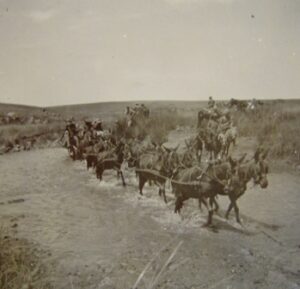
West Wales Boer War Awards
William Lynne Allen, DSO, MID, Major, 2nd Battalion, Border Regiment. (Pennar). William was born on 8 May 1871, at West Lynn, Altringham, Cheshire, the son of Bulkeley Allen, JP, of West Lynn, Altrincham, and Mary Emma Lynn, daughter of Dr Edward Lynn. He was educated at Rugby and was gazetted to the 3rd (Militia) Battalion, The King’s Own Yorkshire Light Infantry in 1891, transferring to the Border Regiment 9 September 1893. Throughout the South African War he served in the 1st Battalion, being Regimental Transport Officer in the earlier stages, and Adjutant in the latter part of the war; he continued to hold this position afterwards until 1904. William was present a several major battles, and for his services was twice mentioned in Despatches, in the London Gazette of 10 September 1901, and 29 July 1902. William was also awarded the Distinguished Service Order in the London Gazette of 31 October 1902: ‘William Lynn Allen, Captain, The Border Regiment. In recognition of services during the operations in South Africa.’ He continued to serve with the regiment between the wars, and in October 1914 went to France with the 7th Division, which took part in the defence of Ypres. William was killed at Ypres on 28 October 1914.
William Charles Beeton, DCM, Private, 3765, 12th Lancers. (Pembroke). William was born in Pembroke. He enlisted into the 12th Lancers direct from the 1st (Volunteer) Battalion, The Welch Regiment in December 1893, aged 18 years. He embarked for South Africa in October 1899, and saw action in the engagement at Magersfontein on 11 December. His gallantry while manning a Maxim gun during the ensuing battle brought him widespread fame soon after the fighting, and was mentioned in Lord Roberts’ despatch about the battle. As a result, William was awarded the Distinguished Conduct Medal. Mobilised from the Army Reserve in August 1914, he was embarked for France with his old regiment in early September and fought in France throughout the war, being awarded the French Medaille Militaire in the London Gazette of 12 July 1917. He became a member of the Home Guard during the Second World War.
Alfred Richard Glynn Begbie, MID, Captain, Royal Field Artillery (Llanrhystud). Alfred was born in April 1875, the eldest son of Lieutenant Colonel Begbie, Royal Engineers and grandson of Colonel Lloyd-Phillips, of Dale Castle, Pembrokeshire, and of Mabws, Cardiganshire. After being educated at Haileybury, Alfred was commissioned into the Royal Artillery in June 1895, becoming a Captain by April 1901. Alfred served in South Africa with the 75th Battery, Royal Field Artillery, and saw action throughout the campaign. Alfred was Mentioned in Despatches in the London Gazette of 18 July 1902, for his leadership at Modder River, after taking command of the battery upon the wounding of his superior officers. Alfred was killed near Holspruit on 24 February 1902.
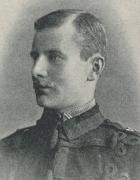
Harry Hickman Bromfield, DSO, Major, 3rd Battalion, South Wales Borderers. (Haverfordwest). Harry was awarded his Distinguished Service Order in recognition of services during the operations in South Africa, 1900-1901. The award was published in the London Gazette of 27 September 1901. He served during the Great War with the 1st Battalion, Welsh Guards, and was killed on the Somme on 11 September 1916.
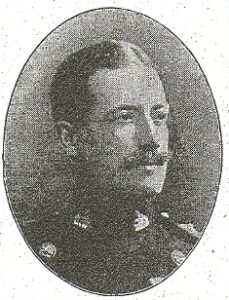
Robert Henry Collis, CMG, DSO, MID, Captain, 6th Dragoon Guards. (Pembrokeshire). Robert was born on 13 January 1874. He was commissioned into the 6th Dragoon Guards on 6 June 1896, and was Captain by the time of the Boer War. He served in South Africa with the 6th Carabiniers, seeing action in several major battles, before being awarded the Distinguished Service Order in the London Gazette of 27 September 1901: ‘Robert Henry Collis, Captain, 6th Dragoon Guards. In recognition of services during the operations in South Africa.’ He retired from the 6th Dragoon Guards on 14 June 1905, becoming a Major in the Pembrokeshire Yeomanry, and served during the Great War as Temporary Lieutenant Colonel in the Remount Service. He was mentioned in despatches three times, and created a CMG in 1918.
Thomas St Clair Davidson, DSO, Major, 1st Battalion, Leinster Regiment. (Carmarthen). Thomas was born in Edinburgh on 12 September 1861, the son of Colonel Sir David Davidson, KCB, and Margaret Buchanan. He was educated at Edinburgh Academy and Edinburgh University, and was gazetted to the Leinster Regiment on 19 December 1883. He served in the Far East before taking part in the South African war, being mentioned in despatches on 29 July 1902. Thomas was awarded the Distinguished Service Order in the London Gazette of 31 October 1902: ‘Thomas St Clair Davidson, Major, The Leinster Regiment. In recognition of services during the operations in South Africa.’ He was promoted to Lieutenant Colonel on 23 May 1907, and retired on 2 September 1911. He served again during the Great War, as commanding officer of the 9th Battalion, The King’s Own Royal Lancaster Regiment. He married Agnes Davies, of Bryn Towy, Carmarthen on 2 November 1892, and they had four children, Dorothy Forster; Winefred Anne; Robert St Clair, and Ileene Hanbury.
Benjamin Evans, DCM, 1601, Quartermaster Serjeant, Welsh Regiment. (Llanllawddog). Benjamin was born at Llanllawddog in 1867, the son of Margaret Morris, of 93, Priory Street, Carmarthen. He worked as a Collier prior to attesting at Cardiff on 18 October 1886 into the Welsh Regiment. Benjamin was to serve for a total of 21 years, and during his time, served with the 1st Battalion, Welsh Regiment in the Boer War in South Africa from 4 November 1899 to 8 August 1904. Ben was wounded at Paardeburg on 18 February 1900, and was awarded the Distinguished Conduct Medal for South Africa, which was announced in the London Gazette of 27 September 1901. He was discharged from the 1st Welsh at Bordon on 17 October 1907, aged 40 years and 10 months, giving his address as being 189, Parrock Street, Gravesend, Kent. In addition to the DCM, Ben was also awarded the Queen’s South Africa Medal, with clasps; Relief of Kimberley; Paardeburg; Driefontein; Johannesburg; Diamond Hill and Belfast, and the King’s South Africa Medal, with clasps; South Africa 1901; South Africa 1902, and the Long Service and Good Conduct Medal. Many thanks to Mark Collins for the details.
Hugh Edwardes, Lord Kensington, CMG, DSO, MID, Lieutenant, 15th Hussars. (Pembrokeshire). Hugh was born on 3 September 1873, son of the 4th Baron Kensington and Grace Douglas. He succeeded his brother in the title in 1900 as 6th Baron Kensington. He was commissioned into the 15th Hussars, and served in the South African War as ADC to Lieutenant General Sir H M L Rundle, for which he was mentioned in Despatches in the London Gazette of 10 September 1901. He was awarded the Distinguished Service Order in the London Gazette of 27 September 1901: ‘Hugh, Lord Kensington, Lieutenant, 15th Hussars. In recognition of services during the operations in South Africa.’ He took command of the newly formed Welsh Horse Yeomanry during the Great War, and took part in the Gallipoli, Egypt, Palestinian and Sinai campaigns. He was again mentioned in Despatches, and created a CMG in 1918.
Arthur Winsmore Hooper, CMG, DSO, Major, Royal Army Medical Corps. (Tenby). Arthur was born in Tenby on 23 February 1869. He was commissioned into the Royal Army Medical Corps on 29 January 1896, and was awarded the Distinguished Service Order in 1901 for his work in South Africa. Arthur served again during the Great War, being created CMG in 1916.
Alexander Frederick Lambton, MID, Captain, 1st Battalion Highland Light Infantry. (Castlemartin). Alexander was born in 1869, the second son of Lieutenant Colonel Francis William Lambton, of Brownslade, Pembrokeshire, late Scots Guards, by his marriage with Lady Victoria Alexandrina Elizabeth, eldest daughter of John Frederick, second Earl of Cawdor. He was the grandson of William Henry Lambton of Biddick Hall, Durham, brother of the first Earl of Durham. He joined the Highland Light Infantry from the Royal Military College in August 1888, being promoted Lieutenant May 1890, and Captain May 1896. He took part in the occupation of Crete in 1898, including the affair of 6 September, being mentioned in despatches, in the London Gazette of 24 January 1899. He embarked for South Africa in October 1899, with his battalion, and joined the Kimberley Relief Force under Lieutenant General Lord Methuen shortly before the battle of Magersfontein, and was killed in action at Magersfontein on 11 December 1899.
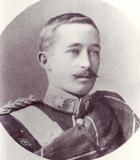
Ronald Robert Lambton, MID, Lieutenant, 1st Battalion Durham Light Infantry. (Castlemartin). Ronald was born in 1879, the 6th son of Lieutenant Colonel Francis William Lambton, of Brownslade, Pembroke, late Scots Guards, by his marriage with Lady Victoria Alexandrina Elizabeth, daughter of the second Earl of Cawdor. He entered the Durham Light Infantry from the 3rd Battalion (Duke of Cambridge’s Own) Middlesex Regiment in May 1899, and was promoted Lieutenant November 1900. He went to South Africa with his battalion in October 1899, which formed part of the Natal Field Force, was present at the battle of Colenso, and in the operations on the Tugela, being severely wounded in the engagement at Vaal Kranz. He also took part in the advance through Northern Natal into the Transvaal. Ronald was mentioned in despatches by General Lord Kitchener, on 8 December 1901, for his “most gallant conduct in trying to repulse the Boer attack”. He died of wounds received on 17 September 1901, and is buried at Vryheid.
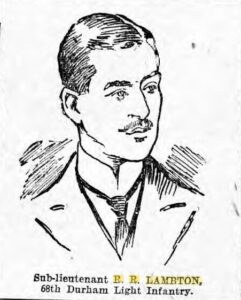
Hugh Brodrick Matthias, DSO, MID, Major, Queen’s Own Cameron Highlanders. (Tenby). Hugh was born at Tenby, on 9 March 1863, the son of George Mathias, of Tenby, and Caroline, daughter of Edward Law, of Staplegrove, Somerset. He entered the Army as a Surgeon in 1886, and served in the Sudan Expedition in 1898, in medical charge of the 79th Queen’s Own Cameron Highlanders. He was present at the Battles of Atbara and Khartoum; was mentioned in despatches twice, in the London Gazette of 24 May and 30 September 1898. Hugh was awarded the Distinguished Service Order in the London Gazette of 15 November 1898: ‘Hugh Brodrick Mathias, Major, Royal Army Medical Corps. In recognition of services in Egypt and the Sudan, including the Battles of Atbara and Khartoum.’ He served in the South African War, in medical charge of the Princess Christian Hospital, being mentioned in despatches in the London Gazette of 10 September 1901.
Reginald Percy MacDonald, DSO, MID, Captain, Hampshire Regiment. (Pembrokeshire). Reginald was born on 10 June 1856, the son of Major General J C Macdonald. He served in the Royal Pembroke Artillery Militia from 1875, before joining the 67th Hampshire Regiment in 1884, serving in Burma. He was mentioned in despatches and awarded the Distinguished Service Order in the London Gazette of 12 November 1889: ‘In recognition of services during operations in Burma. Reginald Percy Macdonald, Captain, The Hampshire Regiment. Decorated for Distinguished Service when on active service in the field.’ Reginald retired from the Army on 19 May 1892.
Hubert James McLaughlin, DSO, MID, Major, Army Service Corps. (Aberystwyth). Hubert was born at Plymouth on 2 December 1860, the son of Major-General E McLaughlin and Mrs McLaughlin. He was educated at Chester, and afterwards at Sandhurst, being commissioned into the 94th Foot. His battalion had been decimated at Isandhlwana by the time that Hubert arrived in South Africa, and it was merged with the Connaught Rangers. Hubert was Mentioned in Despatches for his services in the Transvaal Campaign of 1881. He transferred to the 19th Hussars in July 1884, and took part in the Nile Expedition of 1884-85. In May 1888, he was promoted Captain with the 5th Royal Irish Lancers, reaching the rank of Major in 1893, and retired in 1899. He volunteered for the Boer War in 1899, and joined the Remount Department. Hubert was Mentioned in Despatches in the London Gazette of 17 June 1902, and was awarded the Distinguished Service Order, for showing extreme gallantry in going into Basutoland single-handed to get ponies (London Gazette 26 June 1902). He was Commander of the Central Remount Depot at Aldershot when he died on 28 March 1915.
Edward Darley Miller, CBE, DSO, MID, Captain, Pembroke Yeomanry. (Pembrokeshire). Edward was born in London on 11 February 1865, the son of Edward Miller, of Hartsfield, Betchworth. He was commissioned into the 17th Lancers in October 1886. He served in the South African War as Captain in the Lancashire Hussars, Imperial Yeomanry, and as Brigade Major, Imperial Yeomanry. He was mentioned in despatches in the London Gazette of 10 September 1901, and awarded the Distinguished Service Order in the London Gazette of 27 September 1901: ‘Edward Darley Miller, Captain, Brigade Major, Imperial Yeomanry. In recognition of services during the operations in South Africa.’ He then became the Honorary Lieutenant Colonel, Pembrokeshire Yeomanry. Edward served again in the Great War, was mentioned in despatches for services in France in 1914, and created a CBE in 1919.
Robert Herbert, Mills-Roberts, CMG, Lieutenant Colonel, Royal Army Medical Corps. (Aberystwyth University). Robert was born at Ffestiniog on 5 August 1862, the son of Robert Roberts, Plasmeini, manager of the Oakeley quarries. After graduating from Aberystwyth, he qualified as a surgeon at Edinburgh. He returned to Wales to become surgeon to the Llanberis Quarry Hospital, before volunteering to serve at the Welsh Hospital in South Africa during the Boer War. Robert was mentioned in despatches here, and was made CMG. He returned to Wales becoming MO to the 6th RWF, but at the outbreak of the Great War rejoined the RAMC, and served throughout the war with the 131st Field Ambulance, 38th (Welsh) Division. He was a well known footballer, and had played for his hospital, for the Corinthians, and also for Wales, and for two seasons played for Preston North End. Robert died on 27 November 1935.
Frederick James Moberly, DSO, MID, Lieutenant, Oxford Light Infantry. (Manorowen). Frederick was born in Madras on 15 September 1867, the son of Colonel C M Moberly, ISC, and Mrs Moberly. He was educated at Sandhurst, before being gazetted to the Oxford Light Infantry on 22 August 1888, serving in Indi. He was mentioned in despatches in the London Gazette of 14 July 1893, and awarded the Distinguished Service Order in the London Gazette of 15 August 1893: ‘Frederick James Moberly, Lieutenant, Indian Staff Corps. For services during the recent action at Chilas on the North-West Frontier.’ He was mentioned in despatches for Chitral in the London Gazette of 16 July 1895, and served in the Boer War, being mentioned in despatches again. He served again during the Great War, and married, in 1901, May Johns, of Manorowen, Pembroke.
William Digby Oswald, DSO, Lieutenant, Lancashire Fusiliers. (Milford Haven). William was born at Southampton on 20 January 1880 the only son of Thomas Ridley Oswald, a shipbuilder, and his second wife, Wilhemina Catherine (nee Russell) Oswald of Castle Hall, Milford Haven and of Blackheath. He was educated at Clifton College, Lancing College and at Rugby School before being commissioned into the 6th Battalion, Lancashire Fusiliers (Militia). The following year he was commissioned into the 2nd Battalion, Leicestershire Regiment, seeing service in Egypt and in South Africa where he resigned from his regiment and transferred to the 3rd Railway Pioneer Regiment. He was mentioned in Lord Kitchener’s despatches of 8 March 1902 and was awarded the Distinguished Serve Order, which was reported in the London Gazette of 31 October 1902, for: ‘Services during operations in South Africa’. It was probably for the rescue of a native scout on 31 January 1902 while the enemy were in close pursuit for a number of miles. In 1906 he served as a Captain and Adjutant of Royston’s Horse during the Natal Rebellion and was wounded in the fighting in Zululand in June 1906. He joined the 5th Dragoon Guards at the outbreak of the Great War and was again mentioned in despatches before being given the command of the 12th Battalion, West Yorkshire Regiment. He died on 16 July 1916 of wounds suffered during his battalions assault on Caterpillar Valley two days earlier.
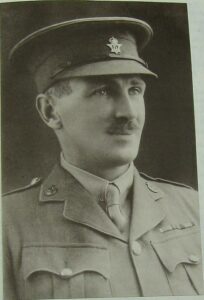
Percy John Probyn, Captain, DSO, Royal Army Medical Corps. (Aberystwyth University). Percy was the eldest son of Frederick Probyn, JP, Cambridge House, Trevethen, Monmouthshire. He was educated at Weston-super-Mare and at Cardiff and Aberystwyth Universities before qualifying as a surgeon at Charing Cross Medical School and Hospital. Percy joined the Royal Army Medical Corps in 1896, serving in the Lagos Expeditionary Force and in the Sierra Leone Expedition. He served in the Boer War, being mentioned in despatches in the London Gazette of 8 February 1901, and was created a Companion of the Distinguished Service Order, London Gazette of 19 April 1901. He had a distinguished medical career after the war, both in the civilian and military fields.
Herbert Owain Pugh, DSO, Major, Lumsden’s Horse. (Llanilar). Herbert was born 9 July 1874, son of Lewis Pugh Pugh, M.P., of Abermaed, Llanilar, and of Mrs V H Pugh, of Cymmerau. He was educated at Sherborne and Rugby, becoming a Merchant in India from 1891, until embarking for South Africa in 1900 with Lumsden’s Horse. Herbert was awarded the Distinguished Service Order for his services in the South African War. The citation, which was published in the London Gazette of 19 April 1901, read; ‘In recognition of services during the operations in South Africa.’ In 1908 Herbert was appointed Secretary to the Territorial Force Association of the Counties of Carmarthen, Cardigan and Pembroke. In 1914 he assisted in raising the Welsh Horse, and was gazetted a Major 30 August 1914. He served in Gallipoli, Egypt and Palestine, and was appointed Second-in-Command of the Berkshire Yeomanry in March 1917. Herbert was severely wounded at Gaza 19 April 1917, and was invalided on account of wounds on 7 May 1918.
George Julian Ryan, DSO, MID, Lieutenant, 2nd Battalion, Royal Munster Fusiliers. (Tenby). George was born at Tenby on 18 September 1878, the son of Colonel George Ryan, RAMC, of Ashby Cottage, Hyde, Isle of Wight, and of Mrs Louisa O Ryan. He was gazetted to the 2nd Battalion, Royal Munster Fusiliers on 8 September 1897, and became Lieutenant 11 March 1899. He served during the South African War, 1899-1902, and was employed with the Mounted Infantry during several major engagements. George was mentioned in despatches in the London Gazette of 10 September 1901, and awarded the Distinguished Service Order in the London Gazette of 27 September 1901: ‘George Julian Ryan, Lieutenant, Royal Munster Fusiliers. In recognition of services during the operations in South Africa.’ He remained in the army between the wars, being mentioned in despatches again on 18 May 1906 for Egypt. He served during the Great War, and was killed while in command of the 2nd Munsters at Givenchy on 23 January 1915, as he was returning across the danger-zone after inspecting his men. Lieutenant Colonel Ryan was mentioned in Field Marshal Sir John French’s Despatch of 22 June 1915, and his mother received a telegram of sympathy from the King on the occasion of his death, and also from Lord Kitchener, saying what a loss he was to his country and to the army.
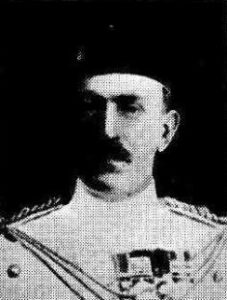
William Edmond Logan Stewart, DSO, MID, Captain, 1st Battalion, Welsh Regiment. (Llandyssul). William was born on 8 October 1873, at Rhosygilwin, Cilgerran, the son of Captain James Stewart, of the Madras Horse Artillery, of Allyrodyn, Llandyssul, JP and DL for Cardigan, and of Louisa Charlotte, daughter of William Butler, Madras Army. He was educated at Winchester, and was gazetted to the Welsh Regiment 29 May 1895, becoming Lieutenant 3 February 1898. He served throughout the South African Campaign with the 1st Mounted Infantry, taking part in several major engagements. He was mentioned three times in despatches, and awarded the Distinguished Service Order in the London Gazette of 31 October 1902: ‘William Edmond Logan Stewart, Captain, The Welsh Regiment. In recognition of services during the operations in South Africa.’ He was promoted to Captain on 22 January 1902. He left the Army 2 May 1906, on retired pay, and joined the Pembrokeshire Yeomanry. William mobilized with the Pembrokeshire Yeomanry at the beginning of the Great War, but was invalided out owing to a badly broken skull on 9 April 1916.
Charles Davies Vaughan, DSO, MID, Captain, Border Regiment. (Brynog, Cardiganshire). Charles was born at Brynog, Cardiganshire on 22 August 1868, the son of Captain Herbert Vaughan, late 68th Regiment, and of Mrs Vaughan, of Whittington, Worcester. He was gazetted to the Border Regiment on 8 June 1889, and served with the Waziristan Expedition, and on the North-West Frontier of India. He was promoted to Captain on 11 November 1898, and served in the South African War, taking part in several major engagements. Charles was mentioned in despatches twice, in the London Gazette of 10 September 1901, and 29 July 1902, and awarded the Distinguished Service Order in the London Gazette of 31 October 1902: ‘Charles Davies Vaughan, Captain and Brevet Major, The Border Regiment (South African Constabulary). In recognition of services during the operations in South Africa.’ He remained in South Africa after the war, and during the Great War embarked for Gallipoli with the 1st Battalion, Border Regiment. He was killed in action at the landing on 26 April 1915.
Weir de Lancey Williams, DSO, MID, Captain, Hampshire Regiment. (Pembroke). Weir was born on 2 March 1872, the son of Sir W J Williams, KCB, of Pembroke. He was commissioned into the Hampshire Regiment on 17 June 1891, taking part in the operations on the North-West Frontier of India. He served in West Africa from 1898, being mentioned in despatches in the London Gazette of 30 May 1899, and was awarded the Distinguished Service Order in the London Gazette of 30 June, 1899: ‘Weir de Lancey Williams, Captain, Hampshire Regiment. In recognition of services during the recent operations in West Africa.’ He was severely wounded during the Boer War, being mentioned in despatches again on 10 September 1901. He became GSO2 to the Welsh Division after the war, and served again during the Great War
William Arthur Glanmor Williams, DSO, Lieutenant, 2nd Battalion South Wales Borderers. (Ferryside). William was born in September 1873, the second son of Hugh Williams of Ferryside, and was educated at Clifton College. He was fond of games and a good cricketer. He entered the South Wales Borderers in May 1893, being promoted Lieutenant October 1895. He served in the operations in the Niger Territories in 1898, including the Benin Hinterland and Siama Expeditions (wounded), being mentioned in despatches and receiving the medal with clasp and the DSO. For his services in the South African War he was mentioned in despatches in the London Gazette of 10 September 1901. William’s death was mentioned in the despatch of Lord Kitchener on 8 May 1901, after he had been killed in action near Bothaville on 6 November 1900.